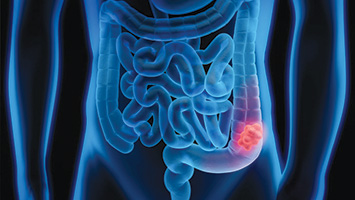 Experts now recommend routine screening for colorectal cancer beginning at age 45. The screening age was lowered in 2021, as the number of young adults being diagnosed with colorectal cancer continued to rise, with many cases diagnosed at more advanced stages than in older adults eligible for screening.
Experts now recommend routine screening for colorectal cancer beginning at age 45. The screening age was lowered in 2021, as the number of young adults being diagnosed with colorectal cancer continued to rise, with many cases diagnosed at more advanced stages than in older adults eligible for screening.
Earlier screening can help identify and remove growths in the colon or rectum called polyps before they develop into cancer — or catch cancer when it’s easier to treat.
Even if you’re younger than 45, you should see your doctor and ask about screening if you have a family history of colorectal cancer or are experiencing symptoms. Patient Brian Coyne had his first colonoscopy at 38 after he noticed rectal bleeding and the procedure uncovered a tumor.
Brian’s diagnosis was stage 3 rectal cancer, for which he underwent multiple treatments and surgeries. Three years later, Brian is living cancer-free and grateful that he went in when he did.
OPTIONS FOR SCREENING
Though colonoscopy is the gold standard, there are several options for colorectal cancer screening. At-home tests are noninvasive and indicate whether further screening is necessary. Talk to your doctor about the best option for you.
Chanthel Kokoy-Mondragon, M.D., a gastroenterologist at UCLA Health’s Santa Clarita Digestive Diseases, said low-risk people can choose among a range of options, from an at-home stool test to a colonoscopy.
“What I recommend is for people to discuss with their physician the options that are available and choose the test that best suits them,” Dr. Kokoy-Mondragon said.
An earlier start to routine screening is expected to find cancer sooner, when it’s easier to treat.
“That’s the goal of lowering the age to 45, to see if we can find these patients earlier, when they are asymptomatic,” she said. “Once patients present with concerning signs or symptoms that could mean that an advanced polyp or cancer is already present.”
Earlier colonoscopies can also prevent colorectal cancer by removing polyps, which are growths in the colon or rectum that can develop into cancer over time.
“Colonoscopy is a great preventative and therapeutic tool, which can remove precancerous polyps before they have a chance to grow into cancer,” Dr. Kokoy-Mondragon said.
THIRD LEADING CAUSE OF DEATH
Colorectal cancer is the third-leading cause of cancer death in men and women. A family history of colon cancer as well as obesity, inflammatory bowel disease, smoking and heavy alcohol use are risk factors.
“Definitely genetics is a huge component, which is why people with a family history of colon cancer should get screened at an earlier age, either at age 40 or 10 years before their first-degree family member was diagnosed, whichever is earlier,” Dr. Kokoy-Mondragon said. “As an example, if they have a family member diagnosed at 45, then they should start screening at 35 and be evaluated for a genetic predisposition for colon cancer.”
People who are Black, Latino or Native American are at greater risk of developing colorectal cancer.
Symptoms that are concerning and should prompt medical evaluation include rectal bleeding, which is one of the most common symptoms seen in younger patients, Dr. Kokoy-Mondragon said. Other symptoms include abdominal pain, changes in stool habits or shape of stools, unintentional weight loss, decreased appetite, worsening constipation and ongoing diarrhea.
(UCLA Health)


